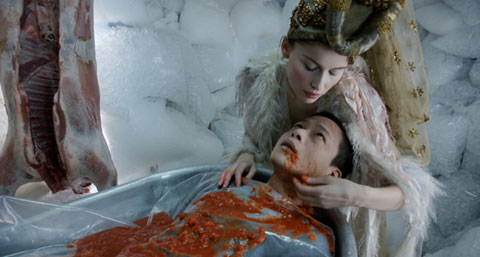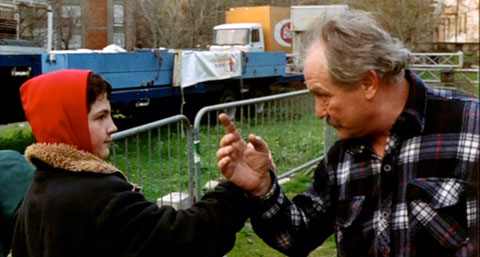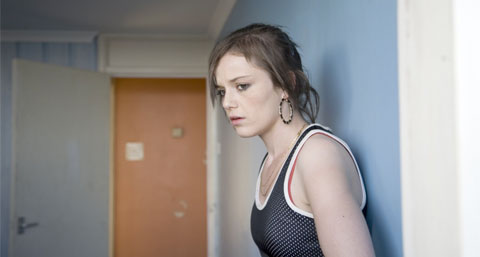Like You Know It All (Hong Sang-soo)
Given the generally low opinion of Like You Know It All among many Hong fans, and given my enjoyment of it, I’ve concluded I just can’t tell the good ones from the bad. This one has everything I enjoy about his work: a self-absorbed, unintentionally cruel, and likable protagonist; a complicated web of sexual entanglements; a calculated yet surprising structure built upon doublings and distorted echoes; and gallons of booze (and arm wrestling!). Here, Kim Tae-woo plays a young filmmaker who wanders through the scenes of his life with little concern for the often-significant consequences of his behavior. He’s more of a catalyst than a person in the film, drifting into the isolated homes of friends only long enough to unsettle the happy chemistry of their lives. I like Hong’s women. They’re independent, sexually liberated, and as confused as the men, which is what makes the final scene in Like You Know It All (and its echo in A Woman on the Beach) so tender and melancholy. Hong’s men expect the women in their lives to grant them access to some secret insight, answers to life’s grand questions, and the film is structured in a way that portends epiphanies. But they never come. Not in so many words, at least.
Face (Tsai Ming-liang)
Those at Cannes who were lukewarm on Face were just plain wrong. Along with being a Tsai greatest hits package — the busted pipes, musical numbers, and obsessive behaviors — and a sequel of sorts to What Time is it There?, Face also includes five or six scenes that are among the most visually arresting and heartbreaking he’s ever filmed. (Does the photo above make more sense if I tell you Laetitia Casta is Salome? How many artists have reimagined the beheading of John the Baptist over the centuries, and how many filmmakers in 2009 would be able to find new textures in the story?) Perhaps this is obvious, but while watching Face I was struck by how much of Tsai’s cinema can be boiled down to simple action. Laetitia Casta taping a window dark or struggling to carry her cumbersome wardrobe up a ladder. Fanny Ardant moving a mounted deer head or applying makeup to Jean-Pierre Leaud’s battered face. And, most moving of all, Chen Shiang-chyi and Yang Kuei-Mei loading and unloading a freezer. It’s elemental. A rich human comedy. I watched Face again on the last day of the fest and am tempted to call it my new favorite Tsai film.
La Pivellina (Tizza Covi & Rainer Frimmel)
La Pivellina fits a certain mold popular these days at international film festivals. At my most cynical, or when beaten down by a particularly thoughtless film, I think of it as “poverty tourism” — an opportunity for upper- and middle-class liberals like myself to safely experience the “gripping, real lives” of those less fortunate. La Pivellina fits the mold, but much to its credit, it avoids a fatal flaw common in the genre: the crisis, which usually involves a rape (see below), a beating, or the theft of the hero’s cherished something or other. (Oh, St. De Sica, look at what thou hath wraught.) Instead, Covi and Frimmel give us three characters who are genuinely kind and generous. In the opening moments of the film, Patty (Patrizia Gerardi), an aging carnie, finds an abandoned toddler with a note from its mother promising to return for the child as soon as possible. Patty walks home with the little girl, and the rest of the film follows her, her husband Walter (Walter Saabel), and their 13-year-old neighbor Tairo (Tairo Caroli) for a week, as they bond with baby Asia. La Pivellina is filled with nice little moments, wonderfully performed — I especially like a scene in which Walter teaches Tairo how to box — but I wish the film had stronger structural bones. The episodes begin by the second hour to feel too disconnected, which leads to a predictably unresolved and, in my opinion, somewhat unsatisfying conclusion. Still, a nice character study of grace.
Fish Tank (Andrea Arnold)
Fish Tank is from the more vicious school of poverty tourism that takes its cues from Hardy, Norris, and Crane (and Von Trier?), the sadists of Naturalism who aren’t satisfied until their heroines have been suitably degraded, preferably under the shadows of Stonehenge. I saw Fish Tank despite my frustrations with Arnold’s first film, Red Road, chalking up her lapses in taste there to her involvement with the “Advance Party concept,” which put certain rules and restrictions on the production. The fact is, I’ll see Arnold’s next film, too, because I really like the way she shoots, especially night scenes, in which characters are back-lit with yellows and reds. Fish Tank is a portrait of Mia (Katie Jarvis), a 15-year-old with no friends (apparently), a drunken whore of a mother, and an adorably foul-mouthed little sister. Mia’s lonely, horny, and mature beyond her years, so when her mother brings home a new man (Michael Fassbender, awesome as usual), they strike up a friendship. And then he drinks a little and rapes her, although the film is designed to make it all seem perfectly consensual. Lovely, even. (Cameron Bailey describes it as a “taboo-breaking love story.”) The final act of the film features characters who barely resemble those we get to know in the first 90 minutes. Arnold has great promise as a director, but the writing needs work. Bonus points to her, though, for digging out Bobby Womack’s cover of “California Dreaming.”




Comments
One response to “2009 TIFF Day 2”
Thanks for your review
about the Tsai Ming-Liang's movie Visage.
As you watched twice the film
during the TIFF festival,
you could be interested in diving again
into the atmosphere of the movie.
Enjoy the website dedicated to Salome!